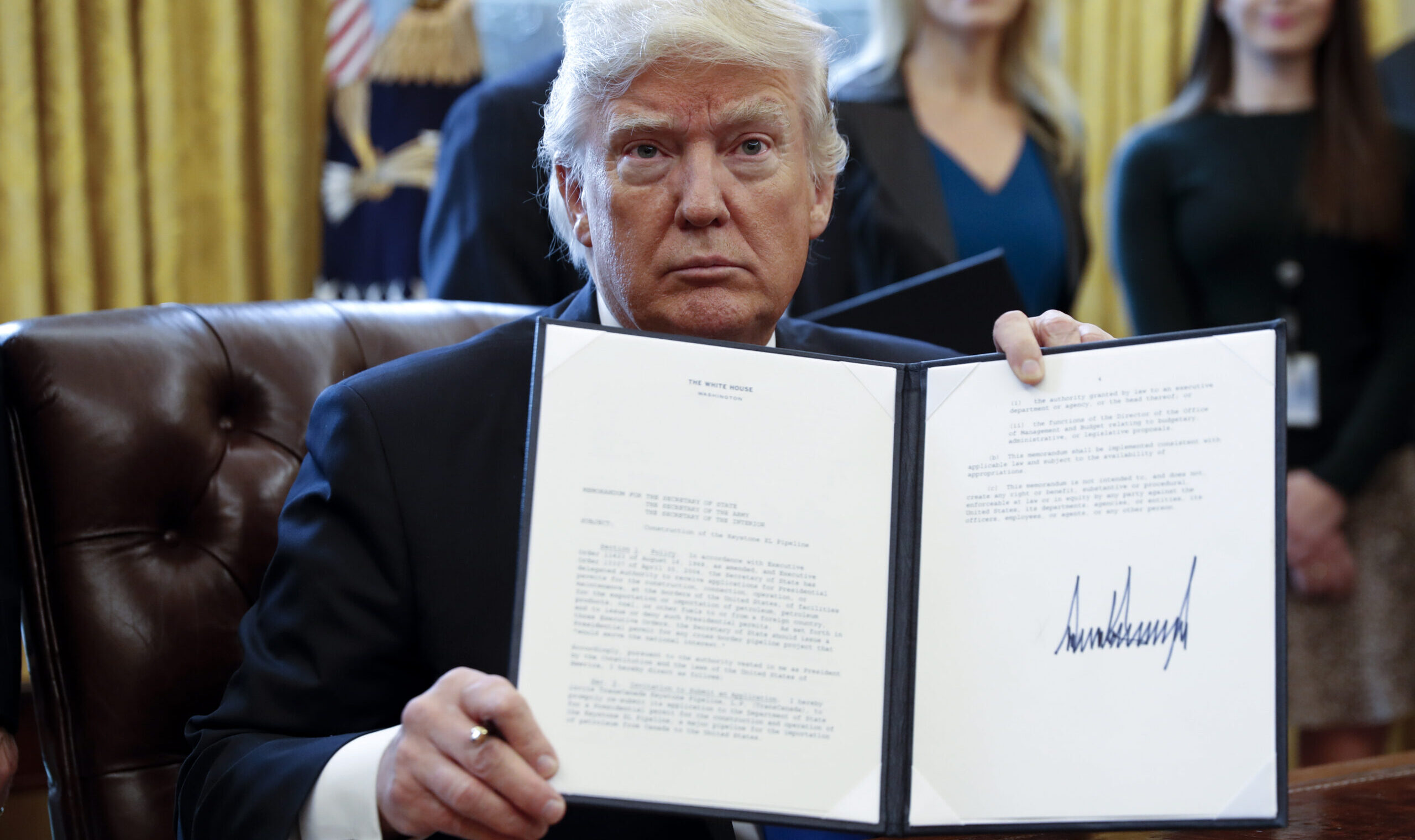Politics
The administration’s latest tactic for expediting deportations will trigger important test cases about the executive’s power.

(Shawn Thew-Pool/Getty Images)
What happens when two solid objects collide? What happens when the immigration jails are full? Is that when you invoke the Alien Enemies Act? Or is there something bigger going on?
ICE announced in the first weeks of the Trump administration it made 32,809 illegal alien arrests. Federal officials have already filled their 47,600 available beds for detainees, and they are working with the various federal prison services to increase bed space while they request more money from Congress.
But more detention capacity won’t do away with the sword of Damocles hanging over Trump’s mass deportation plans—there’s an immigration court backlog, meaning the need to provide due process to those scheduled for deportation is colliding with the goal of clearing millions of illegals out of the U.S. Trump is the victim of his own success. So does that mean it is time to invoke the 1798 Alien Enemies Act?
The Alien Enemies Act, today known as 50 U.S.C. § 21, says
Whenever there shall be a declared war between the United States and any foreign nation or government, or any invasion or predatory incursion shall be perpetrated, attempted, or threatened against the territory of the United States by any foreign nation or government... all natives, citizens, denizens, or subjects of the hostile nation or government, being males of the age of fourteen years and upwards, who shall be within the United States, and not actually naturalized, shall be liable to be apprehended, restrained, secured and removed, as alien enemies.
What’s missing from that summary of the act? Due process. The act provides for none, and that’s what makes it so attractive to the Trump administration with its plans for large-scale deportations. Unlike the 47,000 illegals now in custody, aliens rounded up under the act are not due a day in court before an immigration judge to plead their case (indeed, at least one of the recently deported Venezuelans appears to have an asylum claim pending). The act appears to allow ICE to move arrestees straight from their apprehension to a flight out of the United States.
There are those few technicalities to the Alien Enemies Act; the aliens must be from a nation that launched an “invasion or predatory incursion” against the U.S., and there must be a declared state of war. Passed during the so-called quasi-war with France, the act was meant to give the president broad authority over potential spies and saboteurs at home. Until now, it has only been used during the War of 1812 and the World Wars. The latter was the most notorious use; the act was invoked to intern Japanese immigrants living in the U.S. in remote isolation camps lest they turn against the U.S. while it was at war with the Empire of Japan.
There’s still that part of the act, however, about an invasion taking place as part of a war. The United States is not at war with Venezuela. In his proclamation invoking the act, Trump tried to get around this by referring to the Venezuelan Tren de Aragua (TdA) gang as part of a “hybrid criminal state that is perpetrating an invasion of and predatory incursion into the United States, and which poses a substantial danger to the United States.” The government’s brief on appeal claims “TdA also operates as a de facto government in the areas in which it is operating.”
That is, politely, pretty thin soup to float the deportation of several hundred people without due process on. But since the Act does not require anything but such as proclamation, and faced with a lack of bed space and overcrowded immigration courts standing in the way of getting rid of purported gangsters, the Trump administration went with it as good enough.
While the Venezuelan deportation flight was still in the air, and following a lawsuit filed by the ACLU, U.S. District Judge James Boasberg instituted a temporary restraining order preventing the deportation of the Venezuelans. He also demanded the plane turn around and return the gangsters to the U.S. Going with the specious legal argument that the turnaround order was not in writing, among other excuses, Trump opted not to order the plane back and instead to deposit the gang members in an El Salvadoran prison. (No one is clear on what legal grounds that happened.) Trump thus denies he deliberately ignored a court order; that’s not the legal ground on which he wants to fight this fight anyway.
Boasberg gave the government a second chance to respond, threatening contempt, and the Department of Justice has already filed an appeal. It is almost certain the case will move upward through the court system and is likely to be heard in some fashion before the Supreme Court. The current appeal by the government offers a clue as to how this might play out, stating, “Plaintiffs cannot use these proceedings to interfere with the President’s national-security and foreign-affairs authority, and the Court lacks jurisdiction to do so... the Court should vacate the hearing and de-escalate the grave incursions on Executive Branch authority that have already arisen.”
The Trump strategy is further revealed in a quote from Elon Musk: “If ANY judge ANYWHERE can stop EVERY Presidential action EVERYWHERE, we do NOT live in a democracy.” The Trump administration’s three emergency applications to the Supreme Court asking the justices to limit the scope of injunctions entered by district courts in Baltimore, Boston, and Seattle against the executive order on birthright citizenship repeated Musk’s words almost verbatim, asserting that “the Executive Branch cannot properly perform its functions if any judge anywhere can enjoin every presidential action everywhere.” The constitutional authority Steve Vladeck wrote, “Tellingly, the government is not asking the justices to put the executive order back into full effect. Rather, it’s launching a frontal assault on 'universal' injunctions—urging the Court to limit the district courts’ relief to the specific plaintiffs in those three cases.” Trump has said judges “want to assume the Powers of the Presidency” without getting elected.
Subscribe Today
Get daily emails in your inbox
The muscle-tussle between Trump and the courts is not (just) about the legal technicalities of due process, the Alien Enemies Act, or birthright citizenship. Instead, they are means to an end. Trump is provoking test cases challenging the very power of any part of the judicial system to interfere with his executive power. He is seeking new constitutional ground for that executive authority, citing his unitary power over foreign affairs.
The courts have traditionally shown deference on this issue. (The court in Hamdi v. Rumsfeld even sanctioned military detention as an “enemy combatant” of a U.S. citizen captured in Afghanistan. The War on Terror is the gift that keeps on giving for authoritarianism.) Trump wants to expand that. He likely could care little about the shell that idea will eventually inhabit, whether it be the Enemies Act and a few hundred gang members or something else out of the 150 lawsuits and multiple injunctions he now faces contesting his executive orders.
This is about the case(s) that will form the eventual challenge before the Supreme Court over who, if anyone, can say no to Trump.

 By The American Conservative | Created at 2025-03-31 04:10:11 | Updated at 2025-04-01 22:25:15
1 day ago
By The American Conservative | Created at 2025-03-31 04:10:11 | Updated at 2025-04-01 22:25:15
1 day ago








